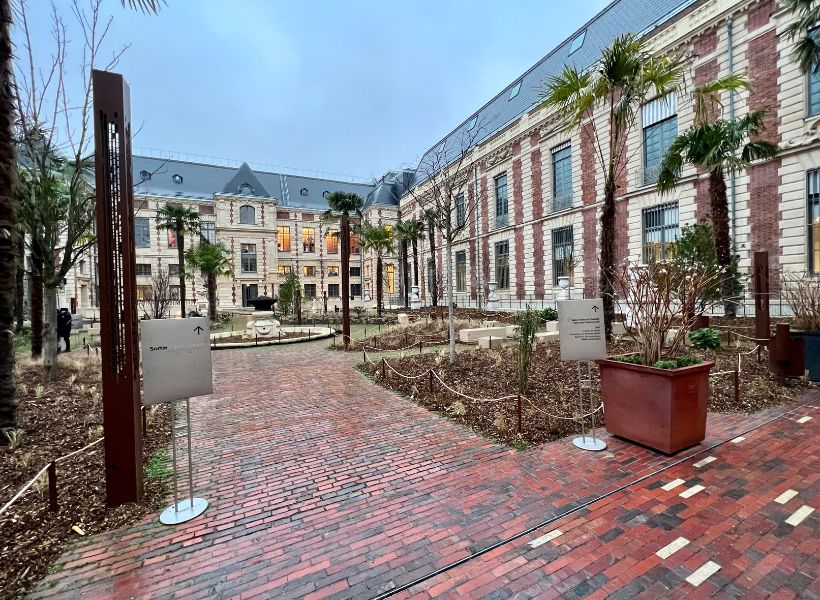This episode features our frequent and very popular guest Elyse Rivin. If you enjoy her episodes, please consider supporting her on Patreon.
On this episode of the podcast, Annie Sargent and Elyse Rivin discuss the Bibliothèque Nationale de France (France's National Library), its history and main sites you can visit in Paris.
Let's start with the word "bibliothèque". In French the word "bibliothèque" means public library whereas "librairie" means a book store. This is a "faux amis" between English and French. But when you see "bibliothèque" in France it's a public library.
The biggest National Public Library in France is the Bibliothèque François Mitterrand in the 13e arrondissement in Paris not far from the Jardin des Plantes. This is a giant site with 4 buildings that are 22 floors.
Much smaller but right in the city center near the Pont des Arts and the Institut de France. It is gorgeous and well worth a visit if you can spare the time.
The oldest library in Paris is the BnF Sainte Geneviève near the Pantheon and is technically a university library.
Bibliothèque Nationale de France Richelieu
This is a favorite of a lot of people because it contains treasures and is gorgeous. The main room is called Salle Labrouste and it's a reading room reserved to researchers, but you can walk through it. Another favorite is the Salle des Manuscripts where you can see the Très Riches Heures du Duc de Berry, an illuminated manuscript. The Salle des Cartes et Plans has treasures like the Plan de Turgot, a detailed map of Paris commissioned by Lous XV. You can see coins and medals in the Cabinet des Médailles. Also not to be missed is the Oval Room where they have a collection of books printed before 1500. The BnF Richelieu was closed for 12 years and reopened in 2022.
A Brief History of Libraries in France
For a very long time people have wanted to collect books and show off their wealth by how many books they owned. And this number increased rapidly!
Clovis and the First French Library
Clovis, the first King of the Franks, is credited with creating the first library in France. Located at the Abbey of Saint Genevieve, the library initially housed 225 manuscripts, a significant number for the 5th century.
The Sorbonne Library
The library of the University of Paris, also known as the Sorbonne, was established in the 1200s and became the most important library in Western Europe for a time. It housed works in multiple languages and was a hub for scholars from various countries.
Charles V and the Royal Library
Charles V, a 14th-century French king, was the first to create a Royal Library. He also promoted the translation of texts into French to make them accessible to his subjects. His library laid the foundation for future royal collections.
François I and Dépôt Légal
François I, a 16th-century king, introduced the Dépôt Légal, a law requiring every printer to submit a copy of their work to the royal library. This law has been in effect for over 500 years and is similar to the modern-day concept of copyright.
Louis XIV and the Move to Paris
Louis XIV moved the Royal Library from the Loire Valley to Paris. His finance minister, Colbert, was responsible for the transfer, and the library was housed in what became known as the Library Richelieu.
Abbott Bignon and Library Organization
Abbott Bignon was hired to organize the Royal Library. His system of categorization laid the groundwork for modern library organization methods.
The French Revolution and Nationalization
During the French Revolution, the Royal Library was renamed the National Library. Rather than being disbanded, it was expanded by incorporating the collections of the nobility.
Napoleonic Era
Napoleon Bonaparte added to the library by confiscating works from other European countries. His actions significantly expanded the library's collection.
19th Century Expansion and Napoleon III
In the mid-1800s, architect Labrouste was hired to expand the library buildings. Leopold Delisle created the first general catalog of printed books, attempting to list everything printed since the Dépôt Légal was established.
In conclusion, the history of libraries in France is a rich tapestry that reflects the nation's intellectual and cultural evolution. From the early days of Clovis' library at the Abbey of Saint Genevieve to the modern National Library, each era has contributed significantly to the preservation and dissemination of knowledge. Laws like the Dépôt Légal and figures such as Abbott Bignon have played pivotal roles in shaping the libraries' collections and organizational systems. The libraries have also weathered significant historical events, such as the French Revolution and the Napoleonic era, adapting and growing in response. Today, they stand as monumental repositories of human thought, continuing a legacy that spans over a millennium.
The Opening Ceremonies for the 2024 Paris Olympics
To see the photo and details visit this page.
More episodes about French culture
Table of Contents for this Episode
#FrenchLibraries, #BibliothèqueNationale, #ParisCulture, #BookLovers, #HistoricFrance, #LibraryTour, #IntellectualHeritage, #FrenchHistory, #PodcastEpisode, #CulturalExploration
FOLLOW US ON:
Subscribe to the Podcast
Apple Google Spotify RSSSupport the Show
Tip Your Guides Extras Patreon Audio ToursIf you enjoyed this episode, you should also listen to related episode(s):




